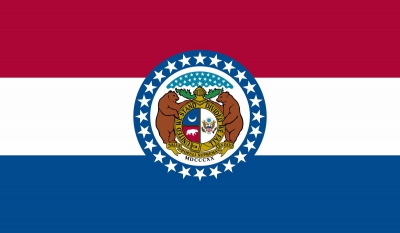Missouri Executive Order 44, commonly known as the Mormon Extermination Order, was an executive order issued on October 27, 1838, by the Governor of Missouri, Lilburn Boggs. The order was issued in the aftermath of the Battle of Crooked River, a clash between Mormons and a unit of the Missouri State Militia in northern Ray County, Missouri, during the 1838 Mormon War. Claiming that the Mormons had committed open and avowed defiance of the law and had made war upon the people of Missouri, Governor Boggs directed that "the Mormons must be treated as enemies, and must be exterminated or driven from the State if necessary for the public peacetheir outrages are beyond all description". The Militia and other state authoritiesGeneral John B. Clark, among themused the executive order to violently expel the Mormons from their lands in the state following their capitulation, which in turn led to their forced migration to Nauvoo, Illinois. The order was supported by most northwest Missouri citizens but was questioned or denounced by a few. However, no determination of the order's legality was ever made. On June 25, 1976, Governor Kit Bond issued an executive order rescinding the Extermination Order, recognizing its legal invalidity and formally apologizing on behalf of the State of Missouri for the suffering it had caused the Mormons.
Missouri is a state in the Midwestern region of the United States. Ranking 21st in land area, it is bordered by eight states (tied for the most with Tennessee): Iowa to the north, Illinois, Kentucky and Tennessee to the east, Arkansas to the south and Oklahoma, Kansas and Nebraska to the west. In the south are the Ozarks, a forested highland, providing timber, minerals, and recreation. The Missouri River, after which the state is named, flows through the center into the Mississippi River, which makes up the eastern border. With more than six million residents, it is the 19th-most populous state of the country. The largest urban areas are St. Louis, Kansas City, Springfield and Columbia; the capital is Jefferson City.
Humans have inhabited what is now Missouri for at least 12,000 years. The Mississippian culture, which emerged at least in the ninth century, built cities and mounds before declining in the 14th century. When European explorers arrived in the 17th century, they encountered the Osage and Missouria nations. The French incorporated the territory into Louisiana founding Ste. Genevieve in 1735 and St. Louis in 1764. After a brief period of Spanish rule, the United States acquired Missouri as part of the Louisiana Purchase in 1803. Americans from the Upland South, including enslaved African Americans, rushed into the new Missouri Territory. Missouri was admitted as a slave state as part of the Missouri Compromise of 1820. Many from Virginia, Kentucky and Tennessee settled in the Boonslick area of Mid-Missouri. Soon after, heavy German immigration formed the Missouri Rhineland.
Missouri played a central role in the westward expansion of the United States, as memorialized by the Gateway Arch. The Pony Express, Oregon Trail, Santa Fe Trail and California Trail all began in Missouri. As a border state, Missouri's role in the American Civil War was complex, and it was subject to rival governments, raids, and guerilla warfare. After the war, both Greater St. Louis and the Kansas City metropolitan area became centers of industrialization and business. Today the state is divided into 114 counties and the independent city of St. Louis.
Missouri's culture blends elements of the Midwestern and Southern United States. It is the birthplace of the musical genres ragtime, Kansas City jazz and St. Louis blues. The well-known Kansas City-style barbecue, and the lesser-known St. Louis-style barbecue, can be found across the state and beyond. Missouri is a major center of beer brewing and has some of the most permissive alcohol laws in the U.S. It is home to Anheuser-Busch, the world's largest beer producer, and produces an eponymous wine produced in the Missouri Rhineland and Ozarks. Outside the state's major cities, popular tourist destinations include the Lake of the Ozarks, Table Rock Lake and Branson.
Well-known Missourians include Chuck Berry, Sheryl Crow, Walt Disney, Edwin Hubble, Nelly, Brad Pitt, Harry S. Truman, and Mark Twain. Some of the largest companies based in the state include Cerner, Express Scripts, Monsanto, Emerson Electric, Edward Jones, H&R Block, Wells Fargo Advisors, Centene Corporation, and O'Reilly Auto Parts. Well-known universities in Missouri include the University of Missouri, Saint Louis University, Washington University in St. Louis. Missouri has been called the "Mother of the West" and the "Cave State", but its most famous nickname is the "Show Me State".

1976Jun, 25
Missouri Governor Kit Bond issues an executive order rescinding the Extermination Order, formally apologizing on behalf of the state of Missouri for the suffering it had caused to members of The Church of Jesus Christ of Latter-day Saints.
Choose Another Date
Events on 1976
- 5Jan
Democratic Kampuchea
The Khmer Rouge proclaim the Constitution of Democratic Kampuchea. - 13Apr
Thomas Jefferson
The United States Treasury Department reintroduces the two-dollar bill as a Federal Reserve Note on Thomas Jefferson's 233rd birthday as part of the United States Bicentennial celebration. - 8May
Six Flags Magic Mountain
The rollercoaster The New Revolution, the first steel coaster with a vertical loop, opens at Six Flags Magic Mountain. - 11Oct
Gerald R. Ford
George Washington's appointment, posthumously, to the grade of General of the Armies by congressional joint resolution Public Law 94-479 is approved by President Gerald R. Ford. - 13Oct
Ebola
The first electron micrograph of an Ebola viral particle is obtained by Dr. F. A. Murphy, now at U.C. Davis, who was then working at the C.D.C.

 English
English  español
español  français
français  português
português  русский
русский  العربية
العربية  简体中文
简体中文 